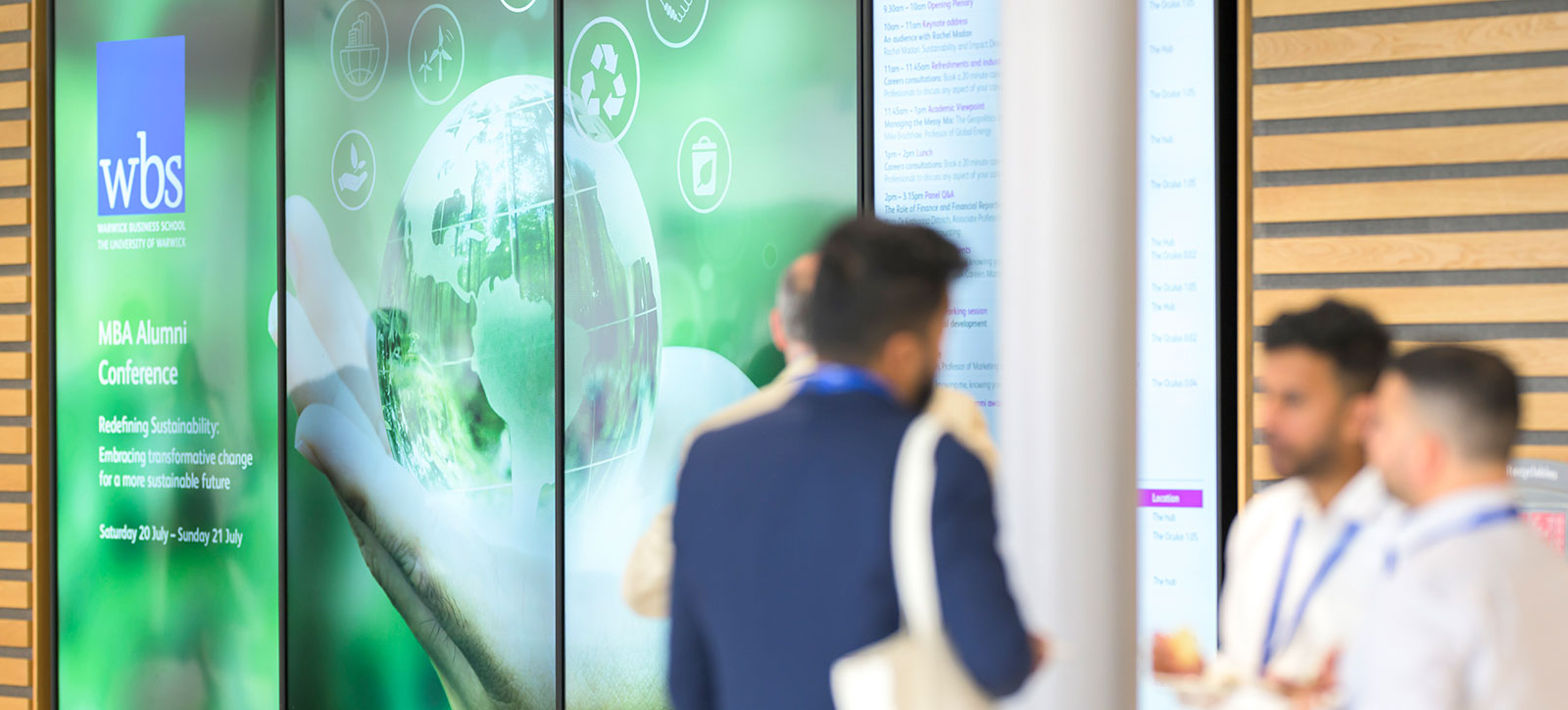
Networking for change: Creating supportive communities can help the first generation of Chief Sustainability Officers to succeed
Warwick Business School has created a Sustainability Professional Network to help alumni form valuable business connections.
The network, which was launched at the School's MBA Alumni Conference, will organise three face-to-face events and three webinars each year covering a wide range of sustainability topics, bringing in experienced professionals and academics to share their knowledge and experience. It also has a LinkedIn group where members can connect.
WBS now has six professional networks, created to support alumni and students working in sustainability, finance, technology, and strategy and consulting, entrepreneurs, and women and other underrepresented groups in business.
Robert McKeon, Co-Chair of the WBS Sustainability Professional Network said: “Sustainability is a topic that has been discussed for a number of years, but usually as a side note. That has changed significantly, which is really positive.
“The aim of the network is to continue building on that momentum and provide the WBS alumni network with opportunities to continue learning about such an important topic in life and business.
“I’m incredibly honoured to be asked to co-chair the network alongside the fantastic Jessica Rasmussen.”
Why is networking so important for sustainability leaders?
The importance of strong networks for sustainability experts was emphasised by Rachel Madan, Sustainability and Impact Director at strategic communications agency Luminous.
Ms Madan has 20 years experience of working in sustainability and has written more than 20 publications. After founding sustainability consultancy Greener Museums she helped to pioneer the change from hardwood shipping crates for transporting artefacts to softwood crates that were more sustainable, cost effective, and better at protecting the precious items inside.
In her keynote address to the MBA Alumni Conference, she said: “The idea of sustainability leaders in business barely existed one generation ago, now there are 600 Chief Sustainability Officers at companies worldwide.
“That is a great change, but when you consider that there are 26,000 Chief Technology Officers and 22,000 Chief Marketing Officers in the US alone, it is a reminder of how far we have to go.
“Alliance and influence building skills are essential for sustainability professionals who aspire to deliver real change.
“You need to develop a diverse network. If you fill it with people like yourself, you are only going to hear what you already know.
“Start building your team now. If you are not a supply chain expert and you encounter a problem in that area, you want to be able to call someone in your network for more information and advice.”
Michael Bradshaw, Professor of Global Energy at WBS and Co-Director of the UK Energy Research Centre, dissected geopolitical challenges facing the green energy transition and journey to net zero.
Meanwhile Hugh Wilson, Professor of Marketing, explored four steps for businesses to adopt a more sustainable approach.
These included integrating social and environmental targets into company strategy; embedding sustainability into all areas of business; innovating to overcome tensions between sustainability and profitability; and collaborating for system-wide transformation.
How can businesses drive the sustainability agenda?
Professor Wilson said: “This is a huge challenge but there is cause for hope. We have already saved the world once where we were faced with a huge problem on ozone.
“From the outside, it may look policymakers saved us on ozone. However, if you look at the inside story, you see the key contribution that businesses made.
“Policymakers will only move when they know it won’t cost them their jobs. They need someone in the private sector to have done the prototyping to make sure these solutions work. Firms like Coca-Cola, that don’t normally work with anyone, did in this instance.
“They eradicated nasty chemicals from products and once they proved it worked, they scaled it up.”
In the first of two Q&A panels Katharina Dittrich, Associate Professor of Organisation Studies, and Hendrik Vollmer, Reader of Accounting, discussed the role of sustainability in financial reporting with EJ Elena Shin, Head of Climate Solutions at Aviva Investors, and Matt Bullivant, Director of Sustainability and ESG Strategy at OakNorth Bank.
In the second, Haley Beer, Associate Professor of Operations Management, explored how to measure and maximise social impact with WBS researcher Ghadafi Razak, WBS alum and Intellecap manager Ruchi Sankrit, and Sean Rach, former Chief Marketing Officer for Prudential (Asia) and a current Doctor of Business Administration candidate at WBS.
Other highlights included a keynote address on creating sustainable value by WBS alum Michelle Sartorio, founder and CEO of True Value Creation, sustainability-focused careers advice and network sessions, and an introduction to the University of Warwick’s own actions to reach net zero by 2030 led by David Elmes, Professor of Practice.
There was also a gala dinner at the British Motor Museum to celebrate the winners of the School’s inaugural Alumni Awards.
Further reading:
How can the world reach net zero?
Six steps to maximise your social impact
Five steps for companies to deliver the UN’s Sustainable Development Goals
Three ways to nudge customers to buy green products
Join the WBS Sustainability Professional Network.
For more articles on Sustainability sign up to the Core Insights newsletter.




 X
X Facebook
Facebook LinkedIn
LinkedIn YouTube
YouTube Instagram
Instagram Tiktok
Tiktok